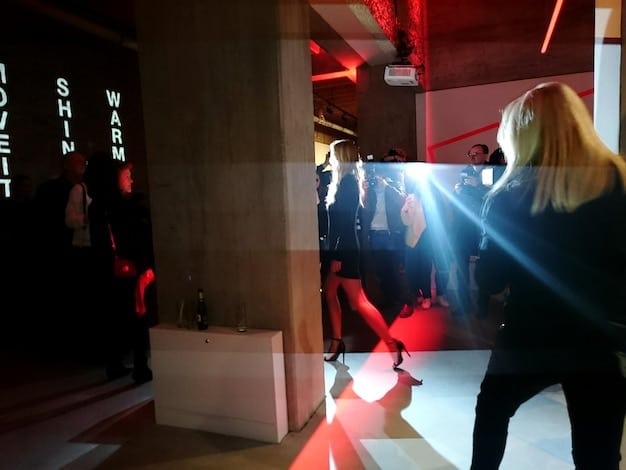Award Show Sponsorships: Brands Dominating 2025

Award show sponsorships in 2025 saw a shift towards tech and consumer brands aligning with cultural moments, demonstrating a strategic focus on audience engagement and brand visibility through high-profile events.
The landscape of **award show sponsorships in 2025** witnessed a dynamic interplay of brands vying for audience attention and cultural relevance. As traditional media evolves, these sponsorships have become crucial avenues for companies to connect with their target demographics, leaving some brands as clear winners.
The Evolving Landscape of Award Show Sponsorships
Award show sponsorships have transformed significantly, mirroring changes in media consumption and marketing strategies. Brands are now looking beyond mere logo placement, seeking deeper engagement and meaningful connections with viewers.
In 2025, the key trends reshaping these sponsorships include:
The Rise of Experiential Activations
Brands are increasingly focusing on creating immersive experiences for attendees and viewers. This involves interactive displays, backstage lounges, and exclusive content offerings that go beyond traditional advertising.
Digital and Social Media Integration
Sponsors are leveraging digital platforms to extend their reach and amplify their message. This includes social media campaigns, live streaming of exclusive content, and influencer partnerships.
- Personalized Experiences: Brands utilize data analytics to deliver targeted content and experiences to individual viewers.
- Interactive Content: Engaging viewers through polls, quizzes, and social media challenges.
- Virtual Reality Integration: Offering immersive VR experiences related to the award show and the brand’s message.
The shift towards experiential activations and digital integration reflects a broader trend in marketing: the desire to create authentic and memorable brand experiences. Companies like Amazon and Google are now competing not just for visibility but for meaningful engagement.
The integration of experiential activations and digital media is no longer a mere add-on; it constitutes the core of successful award show sponsorships. Brands that fail to innovate in these areas risk being overshadowed by their more agile and forward-thinking competitors.

Tech Giants: Leading the Sponsorship Charge
Tech giants like Amazon, Google, and Apple are increasingly investing in award show sponsorships as a way to reinforce their cultural relevance and reach diverse audiences. Their strategies often involve a mix of traditional advertising, experiential activations, and digital integration.
Here’s how these tech giants are making their mark:
Amazon’s Strategic Partnerships
Amazon has been strategically partnering with award shows to promote its Prime Video content and showcase its broader ecosystem of products and services. They focus on creating interactive experiences and exclusive content offerings.
Google’s Data-Driven Approach
Google leverages its data analytics capabilities to deliver personalized experiences and targeted advertising during award shows. They use data to understand viewer preferences and tailor their messaging accordingly.
- Data Analytics: Utilizing viewer data to inform sponsorship strategies and tailor messaging.
- Prime Video Promotion: Showcasing original content and driving subscriptions.
- Product Integration: Seamlessly integrating products like Echo and Fire TV into the award show experience.
The deep pockets and data-driven approaches of tech giants provide them a significant advantage in award show sponsorships. Their strategies go beyond mere logo placement to create meaningful engagement and lasting impressions.
The tech giants’ domination in award show sponsorships underscores the increasing importance of data, technology, and innovation in connecting with audiences. These companies are not just sponsoring events; they are creating experiences that resonate with viewers on a personal level.
Consumer Brands: Capitalizing on Cultural Moments
Beyond the tech giants, consumer brands such as Coca-Cola, Nike, and L’Oréal are also leveraging award show sponsorships to capitalize on cultural moments and reinforce their brand image. Their strategies often involve aligning with specific categories, promoting social causes, and creating emotional connections with viewers.
Key tactics for consumer brands include:
Coca-Cola’s Emotional Storytelling
Coca-Cola has a long history of using award show sponsorships to tell emotional stories and connect with viewers on a personal level. Their campaigns often focus on themes of unity, diversity, and optimism.
Nike’s Commitment to Social Causes
Nike leverages award show sponsorships to promote its commitment to social causes and empower athletes. Their campaigns often feature inspiring stories of athletes overcoming adversity and achieving their goals.
- Social Cause Alignment: Partnering with organizations and promoting social causes that align with the brand’s values.
- Emotional Storytelling: Creating campaigns that resonate with viewers on a personal level.
- Experiential Marketing: Creating immersive experiences that allow viewers to connect with the brand in a meaningful way.
For consumer brands, award show sponsorships are about more than just visibility; they are about creating emotional connections and reinforcing brand values. Companies like Coca-Cola and Nike are masters at this, leveraging cultural moments to tell compelling stories and inspire viewers.
The success of consumer brands highlights the importance of aligning with cultural values and creating authentic connections with viewers. These brands are not just sponsoring events; they are becoming part of the cultural conversation.

The Role of Influencer Marketing in Sponsorship Amplification
Influencer marketing has become an integral part of award show sponsorships, with brands partnering with celebrities, social media personalities, and industry experts to amplify their message and reach wider audiences. These partnerships often involve social media campaigns, exclusive content creation, and live event coverage.
Effective influencer strategies include:
Authentic Partnerships
Brands are seeking out influencers who genuinely align with their values and target audience. Authentic partnerships are more likely to resonate with viewers and generate positive results.
Exclusive Content Creation
Influencers are creating exclusive content for sponsors, including behind-the-scenes footage, interviews, and product reviews. This content offers viewers unique insights and perspectives.
- Social Media Campaigns: Leveraging influencer reach to promote sponsorships and engage with viewers.
- Behind-the-Scenes Access: Providing exclusive content and insights to followers.
- Live Event Coverage: Capturing and sharing real-time experiences from the award show.
Influencer marketing provides brands with a powerful tool to amplify their message and connect with viewers in a more personal and authentic way. By partnering with relevant influencers, brands can tap into new audiences and generate buzz around their sponsorships.
The integration of influencer marketing underscores the importance of authenticity and relatability in connecting with today’s audiences. Brands that can leverage the power of influencers to tell compelling stories and create meaningful engagement are the ones that will succeed in the long run.
Measuring the ROI of Award Show Sponsorships
Measuring the return on investment (ROI) of award show sponsorships has always been a challenge, but new technologies and data analytics tools are making it easier to track the impact of these investments. Key metrics include brand awareness, social media engagement, website traffic, and sales lift.
Effective ROI measurement strategies include:
Brand Awareness Studies
Conducting pre- and post-sponsorship surveys to measure changes in brand awareness and perception. These studies provide valuable insights into the impact of the sponsorship on brand image.
Social Media Analytics
Tracking social media engagement, including mentions, shares, and sentiment analysis. Social media analytics provide real-time data on the impact of the sponsorship on social media conversations.
- Brand Awareness: Measuring changes in brand recognition and recall through surveys and analytics.
- Social Media Engagement: Tracking mentions, shares, and sentiment analysis to gauge viewer engagement.
- Sales Lift: Analyzing sales data to determine the impact of the sponsorship on product sales.
Measuring the ROI of award show sponsorships is crucial for justifying these investments and optimizing future strategies. Brands that can effectively track and analyze their results are better positioned to maximize their return on investment.
The emphasis on ROI underscores the increasing pressure on marketers to demonstrate the value of their investments. By leveraging data and analytics, brands can gain a deeper understanding of the impact of their award show sponsorships and make more informed decisions.
Future Trends in Award Show Sponsorships
Looking ahead, award show sponsorships are likely to become even more integrated with digital and experiential marketing, with brands focusing on creating personalized experiences, leveraging emerging technologies, and aligning with social causes.
Future trends include:
AI-Powered Personalization
Brands will use AI to deliver personalized content and experiences to individual viewers, tailoring their messaging based on viewer preferences and demographics.
AR and VR Integration
Augmented reality (AR) and virtual reality (VR) will become more prevalent, offering immersive experiences related to the award show and the brand’s message.
- AI-Powered Personalization: Leveraging artificial intelligence to deliver tailored content and experiences.
- AR and VR Integration: Creating immersive experiences that enhance viewer engagement.
- Purpose-Driven Sponsorships: Aligning with social causes and promoting brand values.
The future of award show sponsorships will be defined by innovation, personalization, and purpose. Brands that can embrace these trends and create meaningful connections with viewers will be the ones that dominate in 2025 and beyond.
The evolution of award show sponsorships reflects a broader shift in marketing towards more authentic, engaging, and purpose-driven strategies. Brands that can adapt to these changes will be well-positioned to succeed in the ever-evolving media landscape.
| Key Point | Brief Description |
|---|---|
| 🚀 Experiential Activations | Brands create immersive attendee experiences. |
| 📱 Digital Integration | Extending reach through social media and live content. |
| 📊 Data-Driven Strategies | Using analytics to personalize messaging. |
| ⭐ Influencer Marketing | Amplifying messages through celebrity partnerships. |
FAQ
▼
Award show sponsorships provide brands with a high-profile platform to connect with large audiences and enhance brand visibility. They offer opportunities to align with cultural moments and create lasting impressions.
▼
Brands measure success through metrics like brand awareness, social media engagement, website traffic, and sales lift. They use surveys, analytics, and data tools to track the impact of their investments.
▼
Technology enables brands to personalize content, create immersive experiences, and track results more effectively. AI, AR, and VR are increasingly being used to enhance viewer engagement.
▼
Experiential activations are immersive experiences created by brands to engage attendees and viewers. These can include interactive displays, backstage lounges, and exclusive content offerings.
▼
Influencers amplify brand messages and reach wider audiences through social media campaigns, exclusive content creation, and live event coverage. They provide authentic and relatable perspectives.
Conclusion
In 2025, award show sponsorships are marked by a blend of technological innovation, creative marketing strategies, and a deep understanding of audience engagement. Brands that prioritize meaningful connections and leverage emerging trends are best positioned to dominate this dynamic landscape and achieve significant returns on their investments.





